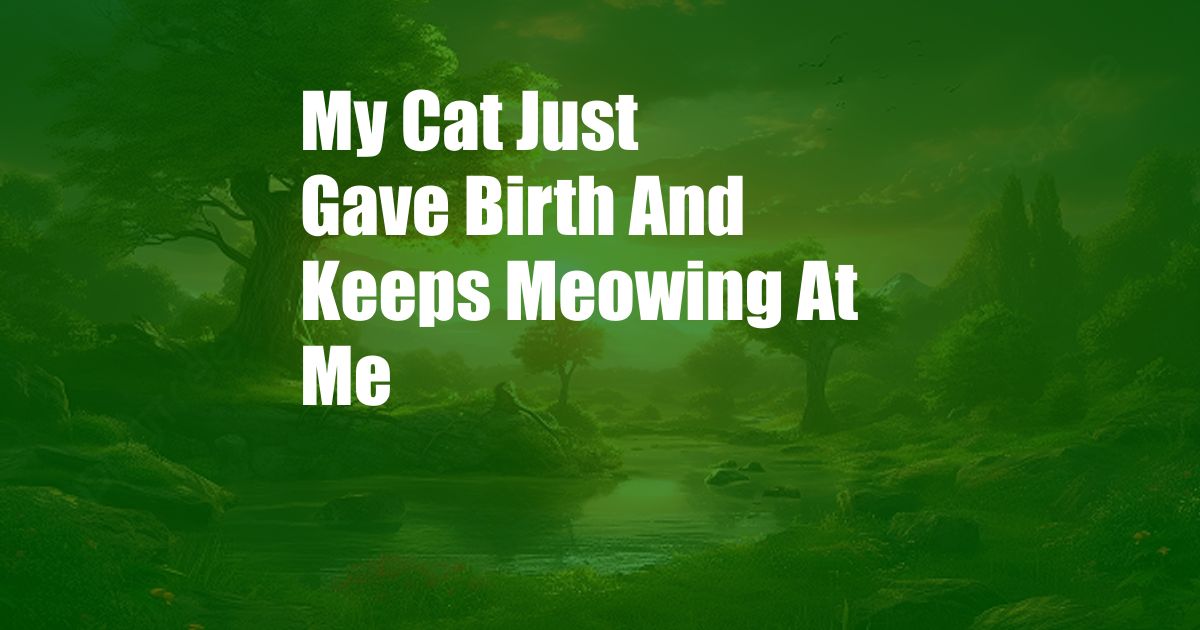
My Cat Just Gave Birth and Keeps Meowing at Me: A Comprehensive Guide for New Cat Parents
As a new cat parent, it’s a joyous and equally overwhelming experience to witness your feline friend give birth and care for her new family. However, if you find yourself wondering why your cat keeps meowing at you after giving birth, you’re not alone. This article will delve into the reasons behind this behavior and provide practical advice on how to respond to your cat’s needs during this important time.
Why Does My Cat Meow After Giving Birth?
There are several reasons why a cat may meow after giving birth. These include:
- Expressing Discomfort or Pain: Labor and delivery can be physically taxing for cats. Meowing may be their way of communicating discomfort or pain.
- Seeking Attention and Reassurance: Cats are social creatures and rely on their humans for care and support. After giving birth, they may meow to seek attention and reassurance from you.
- Nursing Needs: Meowing can be a signal from your cat that she needs help with nursing. She may need assistance in positioning the kittens or ensuring they are getting enough milk.
- Stress or Anxiety: The arrival of kittens can be a stressful event for cats. Meowing may be a way for them to cope with the changes and adjust to their new role as mothers.
Comprehensive Overview of Cat Behavior After Birth
In addition to meowing, cats may exhibit other behaviors after giving birth. These behaviors include:
- Nest-building: Cats will instinctively create a warm and safe nesting area for their kittens.
- Nursing and Grooming: Cats will spend significant time nursing and grooming their kittens to ensure their well-being.
- Carrying Kittens: Cats may carry their kittens from one place to another to protect them from potential threats.
- Protectiveness: Cats may become more protective of their kittens and may hiss or growl if they feel their family is being threatened.
Tips and Expert Advice for New Cat Parents
Caring for a cat after birth requires patience and attentiveness. Here are some tips and expert advice to help you navigate this special time:
- Provide a Quiet and Comfortable Environment: Create a calm and private space for your cat and her kittens. Provide them with a secluded nesting area where they can feel safe and secure.
- Offer Plenty of Food and Water: Ensure your cat has access to fresh food and water at all times. Provide high-calorie food to support her energy needs.
- Assist with Nursing: If your cat is having difficulty nursing her kittens, gently guide them to her nipples and encourage them to latch on.
- Monitor Their Health: Keep an eye on your cat and her kittens for any signs of illness, such as lethargy, discharge, or difficulty breathing. Seek veterinary attention if you have any concerns.
Frequently Asked Questions
Q: How long does a cat meow after giving birth?
A: Meowing after birth typically lasts for several days, but it can vary depending on the cat’s individual behavior.
Q: Why does my cat meow when I pick up her kittens?
A: Cats may meow when you pick up their kittens because they feel threatened or protective. Allow your cat to gradually adjust to your presence and avoid handling the kittens too frequently.
Q: Is it normal for my cat to eat her kittens?
A: While rare, it is possible for cats to eat their kittens if they are stressed, unwell, or sense a problem with the litter. Seek professional help if you observe this behavior.
Conclusion
Understanding why your cat meows after giving birth is crucial for providing appropriate care and support during this special time. By attending to your cat’s physical and emotional needs, you can help her adjust to motherhood and ensure the well-being of her kittens. Are you interested in learning more about cat care during and after pregnancy?